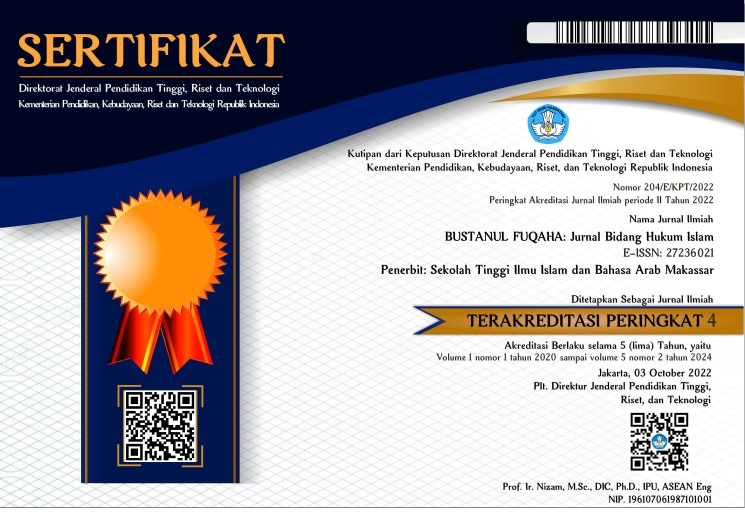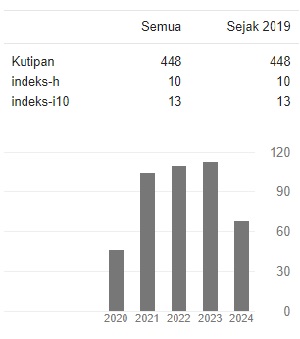Persepsi Kader Muslimah Wahdah terhadap Akad Syirkah dan Implementasinya dalam Perspektif Fikih Muamalat
Wahdah Muslimah Cadres’ Perceptions of the Syirkah Agreement and Its Implementation from the Muamalah Fiqh Perspective
DOI:
https://doi.org/10.36701/bustanul.v5i1.1347Keywords:
Wahdah Muslimah, Syirkah Contract, Muamalah FiqhAbstract
The form of business organization in which two or more people work together in terms of funds, entrepreneurship, skills and good intentions to run a business, is categorized by the jurists as a form of syirkah. However, in practice, we often face problems that can harm various parties, including Muslim women entrepreneurs in Wahdah Makassar. The aim of the research is to determine the perception of Muslim Wahdah cadres regarding the syirkah contract and how it is implemented. The formulation of the problem raised is: first, what is the perception of Wahdah Muslimah cadres regarding the syirkah contract; second, how is the implementation of the syirkah contract among Wahdah Muslim women from the perspective of muamalat fiqh. The method used is a mixed methods method. Apart from that, it also uses an explanatory sequential design approach (explanatory sequential design). The results can be concluded as follows: first, the results of the quantitative descriptive analysis show a figure of 98.1%, which means that the perception of Muslimah Wahdah Makassar cadres is in the positive category, with an average score from respondents of 80.19 points. secondly, the implementation of the syirkah contract among Muslim Wahdah entrepreneurs is also positive, looking at the analysis of the results of the interviews conducted, showing that they understand quite well in carrying out the syirkah contract in accordance with muamalat fiqh. According to them, the syirkah contract is a contract that is prescribed by law, so complete knowledge is needed to carry out this system in accordance with muamalat fiqh.
Downloads
References
Al-Qur’an al-Karim
Buku
Abu Zahrah, Muhammad. Al-Milkiyah wa Nazhariyah al-‘Aqd fi al-Syari’ah al-Islâmiyah. Cet. I; Kairo: Daar al-Salam, 2003.
Agama RI, Kementerian. Al-Qur’an dan Terjemahnya, Edisi 4. Yogyakarta: Ma’had An-Nabawy, 2013.
Al-Ahmadi, Abdul Aziz Mabruk dkk. Fikih Muyassar. Terj. Izzudin Karimi. Cet. I; Jakarta: Darul Haq, 2021.
Al-Fauzan, Shalih bin Fauzan bin Abdullah. Ringkasan Fikih Lengkap, Terj. Asmuni. Cet. V; Jakarta: Darul Falah, 2015.
Hasan, Akhmad Farroh, Fiqh Muammalah dari Klasik Hingga Kontemporer. Cet. I; Malang: UIN-Maliki Malang Press, 2018.
Ibnu Rusyd, Abū al-Walīd Muḣammad ibn Ahmad ibn Mḣammad ibn Ahman. Bidᾱyah al-Mujtahid wa Nihᾱyah al-Muqtaṣid. Kairo: Dār al-Ḣadīṡ, 1425 H. / 2004 M.
J.Creswell, Riset Pendidikan, Perencanaan, Pelaksanaan, dan Evaluasi Riset Kualitatif & Kuantitatif (Edisi 5). Terj. Soetjipto, H. P & Sri Mulyantini Soetjipto. (Yogyakarta: Pustaka Pelajar, 2015.
Al-Nabhani, Taqiyuddin. Al-Nizhâm al-Iqtishâdî fî al-Islâm. Cet. IV. Beirut: Darul Ummah, 1990.
Sabiq, Sayyid. Fiqih Sunnah. Cet. I; Mesir: Dar al-Hadis, 2004.
Al-Sajastani, Abu Daud Sulaiman bin ’Asy’as. Sunan Abu Daud. Tahqiq: Muhammad abdul Aziz Al-Khalidi. Cet. I; Beirut: Dar Al-kutub Al-‘ilmiah, 1996.
Al-Shawi, Shalah dan Abdullah Al-Mushlih, Fikih Ekonomi Islam, Terj. Abu Umar Basyir. Cet. V; Jakarta: Darul Haq, 2015.
Suhendi, Hendi. Fiqih Muamalah. Jakarta: PT Raja Grafindo Persada, 2018.
Al-Syirbini, Syamsuddin Muhammad bin al-Khatib, Mughni al-Muhtaj Ila Ma’rifah Ma’ani Alfaz al-Manhaj. Cet. I; Beirut: Dar al-Ma’rifah, 1997.
Al-Zuhaili, Wahbah. Al-Fiqh al-Islâmî wa Adillatuhu. Damaskus : Dar al-Fikr, 1985.
Skripsi
Alawi, Muhammad, Persepsi Masyarakat Jerowaru Terhadap Sistem Bagi Hasil (Muḍarabah) Pada Ksp Karya Mandiri Jerowaru Lombok Timur, Skripsi. Mataram; Fak. Ekonomi dan Bisnis Islam UIN Mataram, 2021.
Mukhlisin, Persepsi Masyarakat Tentang BMT Dan Hubungannya Dengan Pembiayaan Musyarokah (Penelitian pada BMT Ikhlasul Amal Karangampel), Skripsi . Cirebon; Fak. Syariah Jurusan Muammalah Ekonomi Perbankan Islam IAIN Syekh Nurjati, 2011.
Hanifiah, Nurul, Persepsi Nasabah Terhadap Produk Pembiayaan Musyarakah Pada BRI Syariah Dan BNI Syariah Cabang Pekanbaru, Skripsi. Riau; Fak. Ekonomi dan Ilmu Sosial UIN Sultan Syarif Kasim, 2010.
Jurnal
Deny Setiawan, “Kerja Sama (Syirkah) Dalam Ekonomi Islam”, Jurnal Ekonomi vol. 21 (2013): h. 7.
Dyah Ochtorina Susanti, Syirkah Sebagai Model Investasi Berbasis Syari’ah (Kajian Ontologi), Tribakti Jurnal Pemikiran Keislaman, Vol.24.01.(2013): h.141.
Kamilia Nur Wahyu Ningsih, Strategi Pemasaran Pembiayaan Mikro Sanitasi Berbasis Akad Murabahah di Koperasi Simpan Pinjam Pembiayaan Syariah Syirkah Fastabiqul Khoirot Cabang Jatiroto, Muhasabatuna , Jurnal Akuntansi dan Keuangan Islam 1, no. 01, (2021): h. 43.














